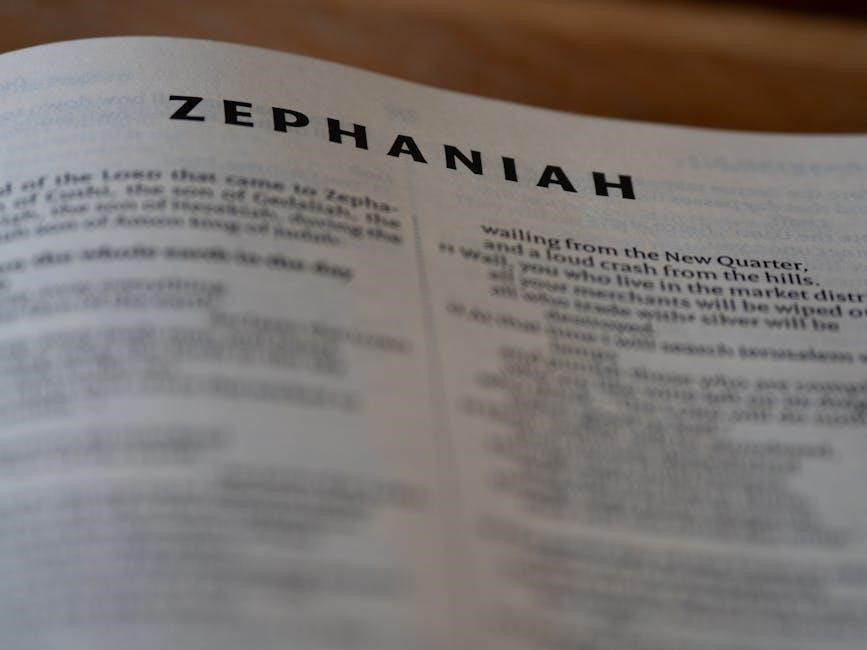The 72 Names of God, derived from Exodus 14:19-21, are powerful three-letter combinations offering spiritual growth, healing, and protection. Used by Moses to part the Red Sea, they connect us to divine energy, providing tools for transformation and inspiration. Available in English PDF resources, they guide meditation and practical applications, becoming a popular spiritual practice globally.
Overview of the 72 Names of God
The 72 Names of God are sacred, three-letter sequences derived from Exodus 14:19-21, each carrying unique spiritual energy. Rooted in Kabbalah, these Names are believed to embody divine attributes, offering tools for meditation, healing, and protection. Each Name serves a specific purpose, such as banishing negativity or fostering abundance. Traditionally, they are linked to Moses’ miraculous parting of the Red Sea. Today, the 72 Names are widely studied and practiced, with resources like English translations and PDF guides making them accessible to modern seekers. Their timeless wisdom connects individuals to higher consciousness, empowering personal transformation and spiritual growth.
Significance of the 72 Names in Kabbalah
In Kabbalah, the 72 Names of God are revered as potent tools for spiritual connection and transformation. These Names, derived from Exodus 14:19-21, are believed to embody divine attributes such as chesed (loving-kindness), gevurah (strength), and tiferet (balance). Each Name is associated with specific energies and vibrations, enabling practitioners to access higher states of consciousness and manifest positive change. Kabbalists use these Names for meditation, healing, and protection, viewing them as a bridge between the physical and spiritual realms. Their structure, formed by combining letters from the three verses, reflects the harmony of divine wisdom. The 72 Names are a cornerstone of Kabbalistic practice, offering deep insights into the nature of the universe and humanity’s place within it.

Origin of the 72 Names of God
The 72 Names of God originate from Exodus 14:19-21, three verses each containing 72 letters. By combining letters sequentially, these verses form 72 powerful divine triplets.
The Biblical Source: Exodus 14:19-21
Exodus 14:19-21 serves as the biblical foundation for the 72 Names of God. These three consecutive verses recount the miraculous parting of the Red Sea, showcasing divine intervention. Each verse contains exactly 72 Hebrew letters, forming the basis for the 72 Names. By aligning and combining these letters in specific sequences, Kabbalists derived the 72 Names, each a triplet of profound spiritual significance. This scriptural source is central to the tradition, linking the names to the divine energies that enabled Moses to perform such a remarkable act, symbolizing God’s power and presence in times of need.
Structure of the Three Verses
The three verses in Exodus 14:19-21 are structured to contain exactly 72 Hebrew letters each, aligning them in a specific pattern. The first verse is written in its original order, the second verse is reversed, and the third verse remains in its original sequence. By combining the letters from these verses, the 72 Names of God are formed. Each name consists of three letters, with the first letter taken from the first verse, the second from the second verse (in reverse), and the third from the third verse. This unique arrangement creates 72 powerful triplets, each carrying distinct spiritual attributes and vibrations, designed to connect individuals with divine energy for protection, healing, and transformation.
How the 72 Names Are Derived
The 72 Names of God are derived from three consecutive verses in Exodus 14:19-21, each containing 72 Hebrew letters. By arranging these letters in a specific manner, the Names are formed. The first verse is read in its natural order, the second verse is read in reverse, and the third verse is read in its natural order again. This method creates 72 unique three-letter combinations, each serving as a Name of God. These Names are believed to channel divine energy, offering profound spiritual and practical benefits. Available in English PDF formats, they provide accessible tools for meditation, healing, and personal transformation, connecting individuals with ancient Kabbalistic wisdom in a modern context.

Significance and Purpose of the 72 Names
The 72 Names of God are sacred tools in Kabbalah, offering spiritual connection, protection, and healing. They embody divine attributes, aiding individuals in overcoming challenges and manifesting positive change, while fostering inner balance and enlightenment through meditation and practice.
Spiritual Power and Vibration
The 72 Names of God embody profound spiritual power, acting as vibrant frequencies that connect individuals to divine energy. Each name, composed of three Hebrew letters, resonates with specific attributes of the Creator, such as healing, protection, or abundance. By meditating on these names, one can align with their spiritual vibrations, amplifying positive change and balance in life. The Zohar highlights their potency, as Moses used them to part the Red Sea, demonstrating their ability to transcend natural laws. These sacred sequences are not just names but gateways to higher consciousness, offering tools for personal transformation and spiritual growth. Their energetic properties make them invaluable for those seeking deeper connection and enlightenment.
Connection to Divine Attributes
The 72 Names of God are deeply linked to divine attributes, each representing specific aspects of the Creator’s essence. These names, derived from Exodus 14:19-21, are structured in triplets that embody qualities like loving-kindness, strength, and balance. Each name connects to a unique divine trait, such as healing, protection, or wisdom, allowing individuals to align with these attributes for spiritual growth. By engaging with these names, one can access the divine energies they represent, fostering harmony and balance in life. Their arrangement in three verses reflects the interplay of divine attributes, offering a profound tool for connecting with the infinite and understanding God’s multifaceted nature.
Practical Uses of the 72 Names
The 72 Names of God offer practical applications for daily life, serving as tools for spiritual growth, healing, and protection. They can be used in meditation to connect with divine energy, helping to overcome challenges and bring balance. Each name has specific purposes, such as banishing negativity or fostering abundance, making them versatile for various needs. Practitioners often incorporate these names into rituals, prayers, and affirmations, enhancing their effectiveness. Additionally, they are used in healing practices, with certain names believed to aid in physical and emotional recovery. Their practicality lies in their accessibility, allowing individuals to apply them in personal and communal settings, making them a valuable resource for those seeking spiritual guidance and transformation.

The 72 Names of God in English
The 72 Names of God, translated into English, provide accessible spiritual tools for meditation, healing, and divine connection. Each name, derived from Exodus 14:19-21, offers unique energies and vibrations, helping individuals align with specific attributes like strength, protection, or abundance. Available in PDF formats, these English translations enable global practitioners to study and apply the names effectively, fostering personal growth and spiritual transformation. These resources often include meanings, pronunciations, and practical uses, making the ancient wisdom of Kabbalah accessible to everyone seeking deeper spiritual understanding and connection to the divine.
Translation and Interpretation
The 72 Names of God, originally derived from Hebrew, are now widely available in English translations, enabling broader accessibility for spiritual practices. Each three-letter sequence retains its divine energy and vibration, offering insights into specific attributes such as healing, protection, or abundance. English interpretations often include meanings, pronunciations, and meditative applications, making the ancient Kabbalistic wisdom user-friendly. These translations are carefully crafted to preserve the spiritual essence of the original Hebrew letters, ensuring that practitioners can connect with their intended divine frequencies. English resources, including PDF guides, provide detailed explanations of each name’s significance, empowering individuals to integrate these sacred tools into their daily lives for personal growth and spiritual alignment with the divine.
Listing the 72 Names
The 72 Names of God are systematically listed as three-letter sequences, each derived from Exodus 14:19-21. These sequences are formed by combining letters from the three verses, with the first letter from the first verse, the second from the second verse, and the third from the third verse. Available in English PDF formats, these listings often include numerical order, Hebrew letters, transliterations, and English translations. Each name is associated with specific divine attributes and purposes, such as healing, protection, or manifestation. The listings provide a clear and organized way to study and utilize the names, making them accessible for meditation, prayer, and spiritual practices. This structured approach ensures that practitioners can easily navigate and apply the profound wisdom embedded in these sacred names.
Pronunciation and Meaning
The 72 Names of God are pronounced using their Hebrew origins, with each name consisting of three letters that carry specific spiritual vibrations. For example, the name “Vav-He-Vav” is pronounced as “Vahv” and symbolizes divine connection and miracles. Each name’s meaning is deeply rooted in its Hebrew letters, reflecting attributes like healing, protection, or abundance; English translations and interpretations help practitioners understand their significance, while maintaining the original spiritual intent. The pronunciation and meaning of these names are often included in English PDF resources, along with transliterations, to guide those unfamiliar with Hebrew. This ensures that the essence of each name is accessible for meditation, prayer, and practical use.

How to Use the 72 Names of God
The 72 Names of God are used for meditation, healing, protection, and manifestation. They can be recited or meditated upon to connect with divine energy and blessings.
Meditation and Spiritual Practice
Meditation with the 72 Names of God is a profound spiritual practice that aligns one with divine frequencies. Each Name, composed of three Hebrew letters, serves as a gateway to specific energetic vibrations. By focusing on these sequences, individuals can access deeper states of consciousness and connect with divine attributes such as compassion, strength, or wisdom. The practice involves reciting, visualizing, or contemplating each Name, allowing its energy to resonate within. This method is believed to enhance spiritual growth, bring clarity, and foster inner peace. Regular meditation with the 72 Names is often recommended to experience their transformative power and integrate their wisdom into daily life for greater harmony and balance.
Healing and Protection
The 72 Names of God are revered for their healing and protective qualities, offering profound spiritual solutions. Each Name carries unique attributes; for instance, the sixth Name, Mem-Hey-Shin, is traditionally used for healing, as it embodies the power to restore balance and well-being. By meditating on or reciting these Names, individuals can harness their energy to neutralize negative influences and create protective barriers. This practice, rooted in Kabbalistic wisdom, is believed to channel divine light, fostering holistic healing and safeguarding against adversity. The Names are often integrated into daily rituals, providing a powerful tool for those seeking spiritual and physical restoration, as well as emotional resilience and protection from harm.
Manifestation and Blessings
The 72 Names of God are a powerful tool for manifestation and blessings, enabling individuals to align with divine will and attract positive outcomes. By focusing on specific Names, such as those associated with abundance or success, one can channel their energy to manifest desires. These Names act as a bridge between the spiritual and physical realms, amplifying intentions and drawing blessings. Kabbalistic teachings emphasize their role in unlocking potential, fostering prosperity, and inviting divine favor. Regular practice with these Names, through meditation or recitation, is believed to enhance one’s ability to manifest abundance and live a life filled with purpose and divine grace, ultimately creating a harmonious and fulfilling existence.

Accessing the 72 Names of God in PDF
The 72 Names of God are widely available in English PDF formats, offering convenient access to translations, meanings, and guided meditations. These resources provide detailed explanations and practical tools for spiritual growth, making them ideal for both study and daily use.
Resources for Download
Various resources for the 72 Names of God are available in English PDF formats, offering easy access to spiritual tools and guides. These include detailed translations, meditations, and explanations of each name’s significance. Many websites provide free downloadable PDFs, while others offer comprehensive guidebooks and study materials. Additionally, apps and digital platforms feature interactive versions of the 72 Names, complete with pronunciation guides and meanings. For those seeking deeper insights, books like The 72 Names of God: Technology for the Soul are available on platforms like Amazon. These resources cater to both beginners and advanced practitioners, ensuring a rich and immersive experience for all seeking to explore this powerful Kabbalistic tradition.
Guides and Study Materials
Guides and study materials for the 72 Names of God are widely available, offering in-depth insights into their meanings and applications. These resources, often in English PDF formats, provide detailed explanations of each name’s spiritual significance, pronunciation, and practical uses. Books like The 72 Names of God: Technology for the Soul by Yehuda Berg are popular for their clear interpretations. Additionally, many websites and apps offer downloadable guides, meditations, and interactive tools to enhance learning. These materials cater to both beginners and advanced practitioners, making the wisdom of the 72 Names accessible to everyone. They also include step-by-step instructions for meditation, healing, and manifestation, ensuring a comprehensive understanding of this powerful Kabbalistic tradition.
Interactive Tools and Apps
Interactive tools and apps for the 72 Names of God offer engaging ways to explore their spiritual significance. Apps like the 72 Names of God Oracle Cards provide digital decks with illustrations, explanations, and meditations. Each card features a name, its meaning, and practical applications, making learning accessible. Guided meditation videos and audio files are also available, helping users connect with divine energies. Some apps include customizable study plans and pronunciation guides, enhancing the learning experience. These tools cater to modern learners, blending tradition with technology to deepen understanding and practice. They are ideal for those seeking a hands-on approach to harnessing the power of the 72 Names for healing, protection, and spiritual growth.

Connection to Kabbalah and Mysticism
The 72 Names of God, rooted in Kabbalistic teachings, are central to Jewish mysticism. Derived from Exodus 14:19-21, they offer powerful tools for meditation, healing, and divine connection.
Kabbalistic Teachings
The 72 Names of God are deeply rooted in Kabbalistic teachings, serving as a bridge between the physical and spiritual realms. These divine names, derived from Exodus 14:19-21, are believed to hold the power to transform and elevate consciousness. Each name is a three-letter sequence that unlocks specific spiritual frequencies, allowing individuals to connect with divine attributes such as Chesed (loving-kindness), Gevurah (strength), and Tiferet (balance). Kabbalists teach that by meditating on these names, one can overcome negative energies, attract blessings, and achieve spiritual growth. The structured arrangement of these names, often in PDF formats, provides a practical guide for those seeking to integrate this ancient wisdom into their daily lives, fostering a deeper connection to the divine and its mysteries.
Mystical Attributes and Energies
The 72 Names of God embody profound mystical attributes, each associated with specific divine energies. These three-letter sequences, derived from Exodus 14:19-21, are believed to connect individuals to the infinite divine force. Each name channels unique spiritual vibrations, enabling access to attributes like wisdom, healing, and protection. They are said to transcend the physical world, offering a gateway to higher consciousness and spiritual awakening. By engaging with these names, one can align with their purpose, dissolve negativity, and attract positive energy. The mystical energies of the 72 Names are often harnessed through meditation, prayer, and focused intent, making them a powerful tool for personal transformation and divine connection.
Historical Use in Jewish Tradition
The 72 Names of God have deep roots in Jewish mysticism, particularly within Kabbalistic teachings. Historically, these names were used to connect with divine attributes and harness spiritual power. They were first revealed in the story of the Exodus, where Moses used them to part the Red Sea. Over centuries, Jewish sages encoded these names in prayers and rituals, believing they held the power to heal, protect, and inspire. The names were often inscribed on amulets and used in sacred ceremonies. Their significance grew as they became a cornerstone of mystical practices, offering a bridge between the physical and spiritual worlds. This tradition continues to influence Jewish spirituality today.
Modern Relevance of the 72 Names
The 72 Names of God have gained global popularity as a spiritual tool for personal growth, healing, and manifestation. Available in English PDFs, they inspire modern seekers, blending ancient wisdom with contemporary applications for a transformative spiritual experience.
Contemporary Applications
In modern times, the 72 Names of God are widely used for spiritual growth, meditation, and practical life challenges. They are embraced as tools for healing, protection, and manifestation, offering solutions to everyday struggles. Many seekers integrate these names into daily practices, such as mantra-like repetitions or visual meditations, to connect with their divine energy. The availability of English translations in PDF formats has made them accessible to a global audience, fostering a bridge between ancient Kabbalistic wisdom and contemporary spirituality. Apps, card decks, and guided meditations further enhance their usability, allowing individuals to apply these sacred names to achieve balance, prosperity, and inner peace in a fast-paced world.
Popularity in Spiritual Communities
The 72 Names of God have gained significant popularity in spiritual communities worldwide, transcending traditional religious boundaries. Their universal appeal lies in their ability to connect individuals with divine energy, offering tools for personal transformation and empowerment. English PDF resources have made these sacred names accessible to a broader audience, attracting those interested in Kabbalah, meditation, and holistic healing. Spiritual groups and workshops increasingly incorporate these names into their practices, fostering a sense of community and shared growth. Their versatility and profound impact have cemented their place as a cherished resource in modern spirituality, allowing seekers to explore ancient wisdom in a contemporary context.
Global Influence and Adaptations
The 72 Names of God have transcended cultural and linguistic barriers, gaining global recognition for their spiritual significance. Their adaptation into English, particularly through PDF resources, has facilitated accessibility for diverse audiences. From Kabbalistic teachings to modern spiritual practices, these names are now integrated into various traditions worldwide. Their universal appeal lies in their ability to resonate with individuals seeking deeper connection, healing, and inspiration. Digital tools, books, and guided meditations in English have further amplified their reach, making them a cornerstone of contemporary spirituality. This global adaptation underscores their timeless relevance and the enduring human quest for divine connection and transformation.
The 72 Names of God are a profound spiritual tool, offering transformation and guidance. Their availability in English PDFs ensures accessibility, making them a timeless resource for inspiration and connection to divine energy.
Final Thoughts on the 72 Names
The 72 Names of God are a profound spiritual resource, offering insights into divine energy and personal transformation. Derived from Exodus 14:19-21, these three-letter combinations provide tools for healing, protection, and connection to the divine. Their availability in English PDFs has made them accessible to a global audience, bridging ancient Kabbalistic wisdom with modern spirituality. Each Name holds specific vibrations and attributes, allowing individuals to tailor their practice to personal needs. Whether for meditation, inspiration, or overcoming challenges, the 72 Names remain a timeless and versatile guide. Embrace their power to deepen your spiritual journey and harness their transformative potential.
Encouragement for Further Study
Exploring the 72 Names of God offers a deeper connection to spiritual wisdom and divine energy. Available in English PDFs, these Names provide accessible tools for meditation, healing, and inspiration. Rooted in Kabbalistic tradition, they empower individuals to address life’s challenges with faith and strength. Whether seeking personal growth, protection, or blessings, the 72 Names are a timeless resource. Consider diving into guided meditations, study materials, and interactive tools to enhance your understanding. Embrace this ancient wisdom to transform your life and align with divine purpose. Let the 72 Names be your gateway to spiritual enrichment and a closer relationship with the divine.